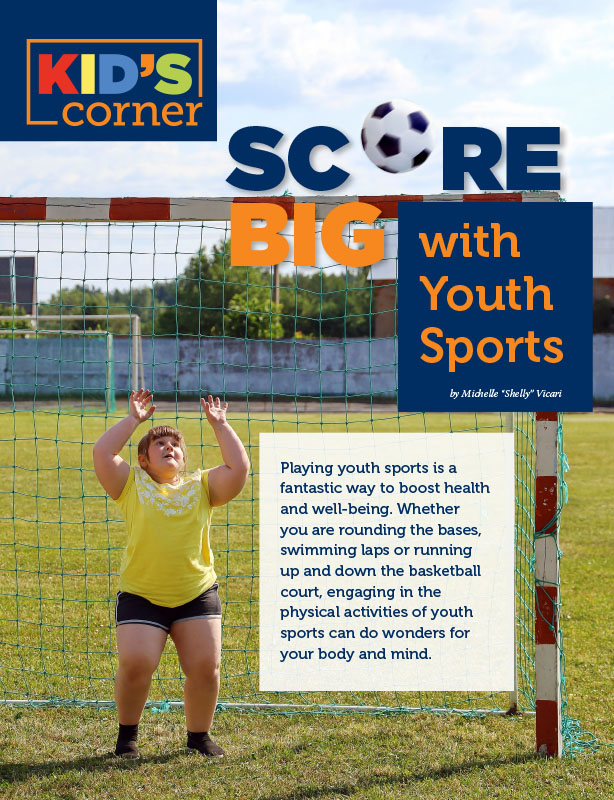Kid’s Corner: Score Big with Youth Sports


by Michelle “Shelly” Vicari
Fall 2023
Playing youth sports is a fantastic way to boost health and well-being. Whether you are rounding the bases, swimming laps or running up and down the basketball court, engaging in the physical activities of youth sports can do wonders for your body and mind.
Physical Fitness
One of the most obvious health benefits of youth sports is improved physical fitness. Early exposure to youth sports offers children a structured environment in which they can learn, practice, and refine fundamental gross motor skills such as running, leaping, throwing, catching and kicking.
During games and practices, activities like rounding the bases, running the length of the field and jumping to make a lay-up get your heart pumping, keeping it healthy and active. Consistently being physically active improves cardiovascular health, strengthens muscles, increases endurance and helps maintain a healthy weight, mitigating the risk of obesity and its associated health complications.
Mental Health Boost
While the physical gains are undeniable, the mental rewards of participating in youth sports are equally significant. Physical exertion triggers the release of endorphins, which are neurotransmitters renowned for their ability to elevate mood. Additionally, children develop crucial skills such as learning to cope with both winning and losing, managing emotions, developing resilience, and enhancing their emotional intelligence. Youth sports participation can potentially have a lasting impact on mental health. Studies suggest that being involved in team sports during adolescence is associated with lower levels of depression symptoms, reduced perceived stress, and higher self-rated mental health among young adults. The experience of being part of a team fosters a sense of belonging and camaraderie, leading to improved self-esteem and confidence.
Developing Social Skills
Engaging in youth sports is a fantastic opportunity to cultivate vital social skills. One important part is making new friends and becoming skilled at interacting effectively. Whether you’re orchestrating a complicated play or coordinating a pass, the essence of success lies in teamwork and communication. Being a part of a team imparts essential life lessons in collaboration, mutual support and collaborative problem-solving. These are important skills on and off the field.
Embracing Differences and Cultivating Empathy
Youth sports bring together individuals from different backgrounds, cultures and abilities. Sports have the power to unite people, breaking down barriers and fostering a sense of understanding and respect for others. This inclusive environment teaches young athletes the importance of empathy and compassion, creating a more accepting and compassionate society.
One barrier to participation in youth sports can be cost. There are organizations like All Kids Play (allkidsplay.org) that can help children access sports through a grant program that provides funding for registration fees and equipment. You can also ask about local opportunities to volunteer in exchange for reduced fees.
Discipline and Time Management
Playing youth sports requires commitment and dedication. Regular practices and games teach you the importance of discipline and time management. You must learn how to balance schoolwork, extracurricular activities and personal life efficiently. Setting goals and working hard to achieve them is a valuable lesson that benefits you throughout your life. One thing to note is that research suggests that families with children in organized sports often experience an increase in fast food consumption and a decrease in homemade meals. Check out our five super quick, family-friendly meal ideas on this page for those nights when the game goes into overtime or extra innings.
Improved Academic Performance
Believe it or not, being involved in youth sports can actually boost academic performance. Engaging in physical activity enhances cognitive functions, including memory and concentration. Regular exercise also reduces stress levels, making it easier to focus and retain information. When you’re physically active, your brain releases neurotransmitters that improve your ability to learn and process information.
Healthy Habits for Life
The habits developed during participation in youth sports can have a profound impact on your adult life. Engaging in regular physical activity as a young person sets the foundation for a healthier lifestyle in the future. People who participate in youth sports are more likely to continue being active throughout their lives, reducing the risk of chronic diseases such as heart disease, diabetes, hypertension and obesity.
Conclusion
From improving physical fitness and mental well-being to developing essential life skills, the benefits of participating in youth sports are undeniable. By incorporating youth sports into a child’s routine, you can lay the foundation for a lifetime of well-being. So, lace up your sneakers and grab your gear!
About the Author:
Michelle “Shelly” Vicari, OAC Senior Program Manager and Past OAC Chair, majored in Child Development and Family Studies as well as Political Science at San Diego State University. She was formerly the Curriculum Director at the largest Child Care Centers accredited by the National Association for the Education of Young Children (NAEYC) in Southern California. She has authored numerous curriculum guides for teachers working with young children and was lucky enough to once meet Mr. Fred Rogers!
by Sarah Muntel, RD Spring 2024 Spring has sprung, bringing sunnier and warmer days! For many, this…
Read Articleby Yelena Kibasova Spring 2024 The fitness world is evolving, with new trends and innovations that promise…
Read Articleby Robyn Pashby, PhD Winter 2024 “No one is ever going to date you if you don’t…
Read Article








